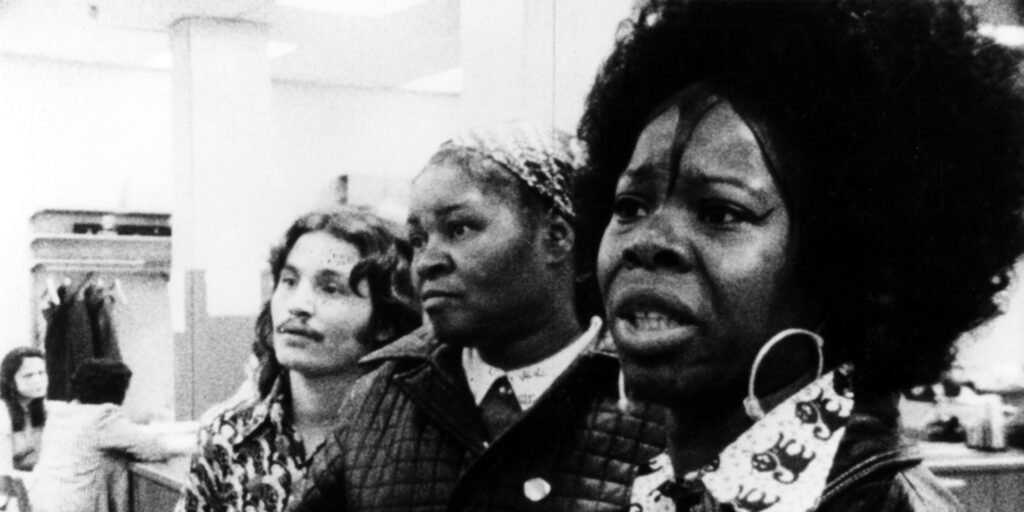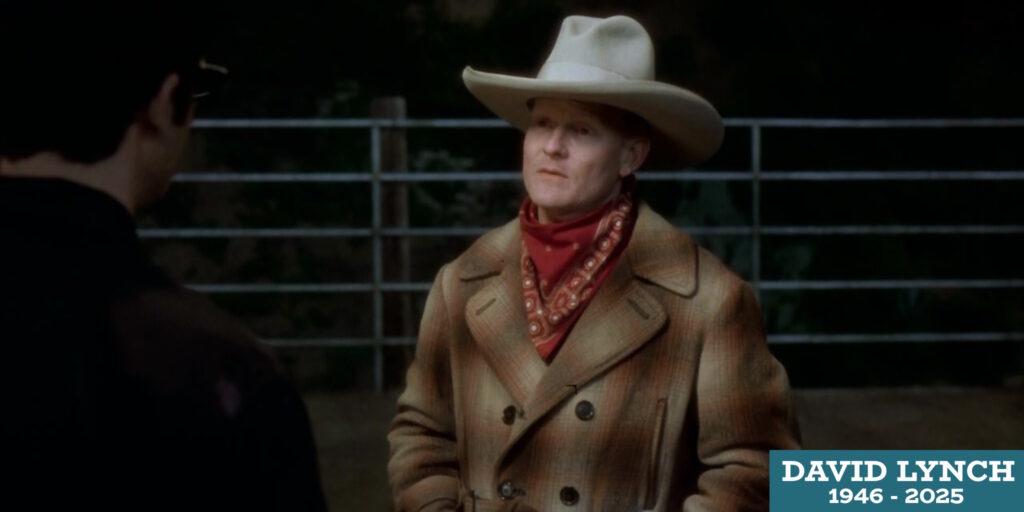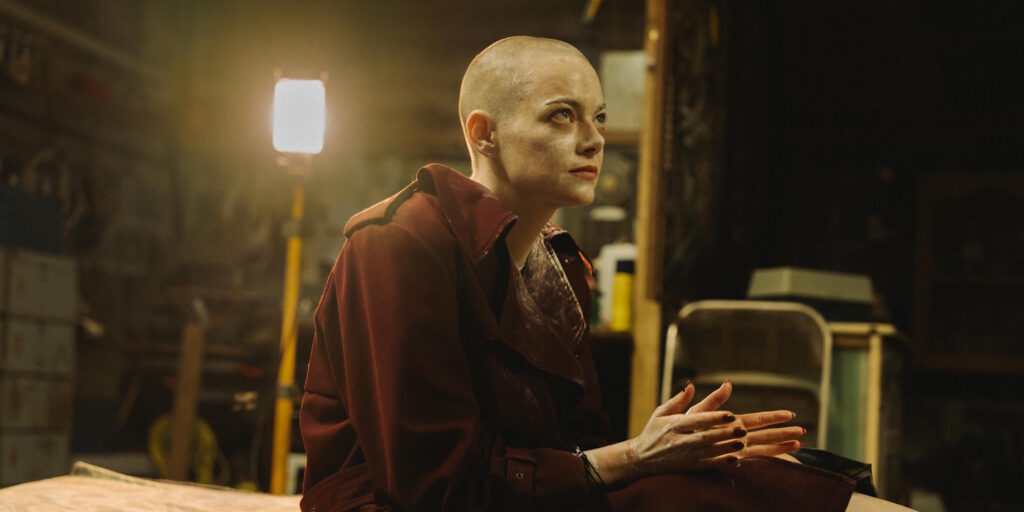Stephen King’s 1982 novel The Running Man is one of the author’s more uncharacteristic works. This dystopian science-fiction tale – set, as it happens, in a capitalist hellhole version of the United States in the year 2025 – concerns a hope-starved man who volunteers for the titular reality competition show. The in-universe “The Running Man” is essentially a gamified take on The Most Dangerous Game (1932) with ad breaks. Contestants attempt to survive for 30 days while network-affiliated assassins known as Hunters stalk them across a totalitarian America. Every day spent in the wind nets the contestant (or, more likely, their next of kin) a bigger purse, and the final payout to any runner who lasts the full month is a whopping $1 billion. No one ever has attained this prize, partly because workaday citizens can claim a cash reward by reporting sightings of the contestants. Which means that every man, woman, and child in this crapsack America is a potential surveillance camera (in addition to all the actual cameras controlled by the government-cum-network).
Protagonist Ben Richards is a blandly archetypal sci-fi everyman, whose reedy desperation and unlikely knack for survival makes him an ideal candidate for the show in the eyes of its slimy executive producer, Dan Killian. Although Richards is hardly a babe in the woods, participating in “The Running Man” opens his eyes to the true depths of the network’s cynical malevolence, and he soon becomes an avatar for the frustrations of the discontented masses, to the amusement (and, eventually, panicky terror) of Killian and the network.
Like most of the early works King penned under his Richard Bachman pseudonym, The Running Man is a dark, bitter novel. It expresses a young man’s righteous indignation at the commercialized vulgarity of American life, and speculates – not inaccurately, it turns out – on how crass televisual spectacle might become a tool of authoritarian control, crude in its brazenness but sophisticated in its application. The novel’s horror is of a grim and violent stripe, and it jitters with an atypical, urgent momentum. King reportedly banged out the manuscript in roughly a tenth of the time he normally takes to write a draft of similar length.
The Running Man isn’t necessarily the first dystopian tale about a reality-show bloodsport – Robert Sheckley’s 1958 short story “The Prize of Peril” is an earlier contender – but King’s story proved vivid and timely, repulsed by the maggoty underbelly of the revanchist, corporate conservatism that was ascendant in Reagan-era America. In a way, the horror author was ahead of the curve: It was another six years before Edward S. Herman and Noam Chomsky would make “manufacturing consent” a buzzy phrase among leftist media critics.
After King’s pseudonym was exposed in 1985 and the Bachman-authored novels enjoyed a newfound surge in popularity, it was perhaps inevitable that a premise as compelling as The Running Man’s would be snapped up by Hollywood. Director Paul Michael Glaser’s 1987 film adaptation is a fun but silly 1980s relic: a campy, lightly satirical action vehicle that bears little resemblance to King’s novel, reimagining the titular show as a WWE-meets-American Gladiators arena-bound death sport. The film has a cult following but is now best remembered for star Arnold Schwarzenegger’s self-parodic quips (“He had to split!”) and the masterstroke of casting actor-turned-Family Feud host Richard Dawson as the sweaty, villainous Killian. (In retrospect, Dawson’s performance feels like an eerily prescient channeling of Vince McMahon, before the wrestling promoter rose to true cultural prominence, and long before his unrepentant shitbag persona was exposed as no persona at all.) Yet Glaser’s adaptation feels neutered, awkwardly wedging a half-baked story of wronged-man vengeance and political resistance into a cheapjack John Carpenter imitation. Maybe Herman and Chomsky were onto something.
Given the misfire that is the 1987 film, one can understand why writer-director Edgar Wright and screenwriter Michael Bacall might want another crack at adapting King’s novel. Whatever else one might say about their new version of The Running Man, it is much more faithful to the source material, in plot if not in tone. (At least until its final, wildly misconceived five minutes; more on that in a moment.) Wright and Bacall – who receive story credits alongside the latter’s screenplay credit – deftly update the novel’s worldbuilding, imagining a not-too-distant America where retro-futurist tapepunk decay jostles with extrapolations of real-world technologies like drones, biometrics, and deepfakes. (Production designer Marcus Rowland has definitely played his share of Cyberpunk 2077.)
Why, then, does this new The Running Man adaptation feel just as hollow as its predecessor, despite its more sure-footed success as a propulsive chase film? Maybe it’s just the baked-in disposability of feature-length action cinema, which has little space for the nitty-gritty setting details and more ruminative story beats that might have conveyed the depths of the film’s uncomfortably relatable despair. Maybe it’s the plastic-wrapped himbo energy of leading man Glenn Powell, whose thinly sketched attributes as Richards – devoted to his wife and child, with a strong moral compass undercut by his Incredible Hulk temper – feel simultaneously fussed-over and insultingly meager. Or maybe it’s the insufferable, contemptuous smugness of a glossy, $110 million studio picture that repeatedly reminds its viewers that there is no ethical consumption under capitalism, all while pummeling that same audience with barely disguised (or outright lampshaded) advertisements for real-world brands.
This isn’t to say that a film can’t successfully tap-dance on the razor-thin line between shameless commercialism and gleeful satirization of the same. (See Henry Elfont and Deborah Kaplan’s 2001 adaptation of Josie and Pussycats for a particularly ticklish exemplar of the form.) Heck, if no less a figure than Hideo Kojima can stick a gratuitous Monster Energy product placement into one of his high-minded video games and still maintain his lofty auteurist credibility, it’s not hypocrisy per se that is the issue. Perhaps there’s just no squaring the circle of an Edgar Wright-helmed The Running Man film. The director is attuned to the grotesque absurdities of the future world that King imagined and capably filters them through his own dazzling, hyperkinetic sensibilities. However, he doesn’t have the acidic instincts of a Carpenter or Verhoeven. He’s a romantic humanist at heart, which means that his punches feel somewhat pulled, and, most egregiously, that he doesn’t have the punk courage to commit to the novel’s violent, nihilistic conclusion.
At the film’s opening, Powell’s Richards is struggling with chronic unemployment. After one too many turns as a safety whistleblower, he’s been blacklisted from the hazardous blue-collar jobs where he once eked out a meager living for his young wife, Sheila (Sinners’ Jayme Lawson), and their now-ailing toddler. At the end of his rope, Richards auditions for one of the Games Network’s glitzy, televised bloodsports, with the hope of walking away with a modest payout and only a few broken bones. In one of the film’s niftier touches, Wright intercuts Richard’s tryout with flashbacks to his industrial-accident heroics, illustrating how this unusually swole working stiff’s wage-slavery experiences prepared him for the network’s American Ninja Warrior-style trials.
Producer Dan Killian (Josh Brolin) sees something in Richards, a testy rebelliousness – and, perhaps, a certain dumb-guy underdog delusion – that makes him a perfect fit for “The Running Man”. Killian smooth-talks Richards into signing a contract, and soon the latter man is donning a custom jumpsuit and meeting the show’s flamboyant master of ceremonies, Bobby T. (Colman Domingo, having the time of his life). Richards and his two fellow Runners (Katy O’Brian and Martin Herlihy) are given a 12-hour headstart and the unrestricted run of the entire United States but are otherwise constrained by the game’s complex rules. Once a day, they must record and post a 10-minute video to the network or forfeit their entire prize purse. And, of course, the proverbial deck is stacked against them, between 300-million-odd eager snitches and a squad of elite manhunters led by a masked psychopath named McCone.
Wright and Bacall stick relatively close to the events and characters of King’s novel, which straightaway distinguishes this iteration from the 1987 adaptation. However, Wright’s version lacks the dismal, gritty tone of the book, instead favoring a splashy, overstimulated style that matches the crude, violent, no-attention-span media of the film’s dystopian setting. Which isn’t necessarily a complaint: Wright and frequent editor Paul Machliss slyly blur the lines between their film and the fictional show-within-the-film, employing rapid-fire cutting, flashy transitions, and copious POV shots from the network’s omnipresent drone cameras. Bobby T.’s relentless, pun-filled color commentary – which intensifies whenever the Hunters are closing in on their prey – has a charmingly distressing metatextual dimension. It feels like the reductio ad absudum of an idiocratic culture where watching people watch other media is now an entire content subgenre, and habitual second-screening has accelerated the demand for entertainment that repeats and overexplains itself.
Perhaps it’s overly generous to assume that The Running Man is smart enough to advance such critiques. On the one hand, the film seems to acknowledge the multilayered psychological intricacy of entertainment-as-propaganda. At one point, Richards’ streetwise ally Bradley (Daniel Ezra) – whom the film reimagines as a Sun Ra-flavored V for Vendetta pirate broadcaster – explains that Runners are selected not based on skill but to fill specific narrative archetypes in a season’s script. It’s a crucial observation that will be familiar to any savvy reality-show aficionado, but it unlocks Richards’ growing awareness of the tiered systems of control that encircle him, even as he runs for his life. On the other hand, however, the screenplay deploys pro-worker, anti-wealth, and anti-consumerist rhetoric with all the elegance of a high-school junior who used ChatGPT to generate some vaguely Marxist platitudes the night before debate class. It’s positively eye-rolling precisely because it lacks the excitable earnestness of idealism: It’s sub-performative, mere dutiful window dressing for the feature’s kindergarten-simple story of righteous defiance.
Powell’s performance is strongest when Richards is in a prickly fuck-you mode, less so when he’s glowering through clenched teeth about his wife and daughter. Channeling a 1990s George Clooney for his accent, he makes for a serviceable action hero, even if he never quite convinces in the serious moments. (Irreverence is more in his wheelhouse, going back to his breakout, scene-stealing role as a jokester jock in Everybody Wants Some!!) In addition to Brolin and Domingo, the cast is shored up by its other supporting performances, including William H. Macy as a crusty black-market tinkerer and Michael Cera as an oddball leader in the underground resistance. They enliven what would otherwise be a more dramatically colorless affair, notwithstanding Wright’s hectic direction and the garish-yet-grimy future world crafted by Rowland and the rest of the film’s production team.
As an action feature, The Running Man is successful enough, filmed with a breathless, R-rated brio that highlights Richards’ quick-witted improvisation and good ol’ dumb American luck when his back is against the wall. However, in a year in which some of our most vital working filmmakers are grappling earnestly (if not always successfully) with the rise of authoritarianism, corporatism, and the perils of what historian Timothy Snyder terms “obeying in advance,” Wright’s film feels like it’s indulging in a shallow, perfunctory kind anti-fascist cosplay. (Or perhaps dime-store Halloween dress-up, as cosplay implies effort.) This is most frustratingly evident in the film’s conclusion, which swaps the brutal, fiery realism of King’s original novel for the sort of discordantly upbeat, self-flattering ending that satisfies test audiences and literally no one else. It’s a ruinously sour final note for a film that primarily coasts on polished action craft, satirical sci-fi snark, and the screaming inertia of a demolition derby.
The Running Man opens in theaters everywhere on Friday, Nov. 14.




